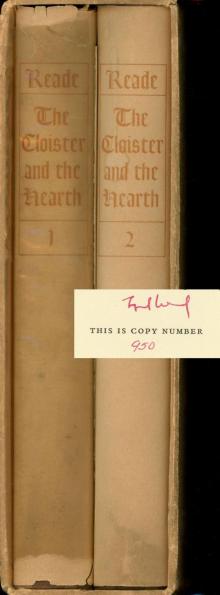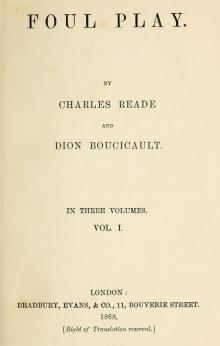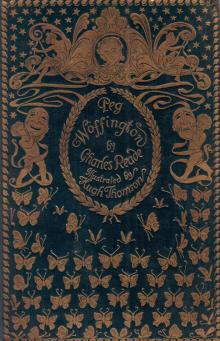- Home
- Charles Reade
White Lies
White Lies Read online
Produced by Donald Lainson
WHITE LIES
By Charles Reade
CHAPTER I.
Towards the close of the last century the Baron de Beaurepaire livedin the chateau of that name in Brittany. His family was of prodigiousantiquity; seven successive barons had already flourished on this spotwhen a younger son of the house accompanied his neighbor the Duke ofNormandy in his descent on England, and was rewarded by a grant ofEnglish land, on which he dug a mote and built a chateau, and called itBeaurepaire (the worthy Saxons turned this into Borreper without delay).Since that day more than twenty gentlemen of the same lineage had heldin turn the original chateau and lands, and handed them down to theirpresent lord.
Thus rooted in his native Brittany, Henri Lionel Marie St. Quentin deBeaurepaire was as fortunate as any man can be pronounced before hedies. He had health, rank, a good income, a fair domain, a goodlyhouse, a loving wife, and two lovely young daughters, all veneration andaffection. Two months every year he visited the Faubourg St. Germain andthe Court. At both every gentleman and every lacquey knew his name, andhis face: his return to Brittany after this short absence was celebratedby a rustic fete.
Above all, Monsieur de Beaurepaire possessed that treasure of treasures,content. He hunted no heart-burns. Ambition did not tempt him; whyshould he listen to long speeches, and court the unworthy, and descendto intrigue, for so precarious and equivocal a prize as a place in theGovernment, when he could be De Beaurepaire without trouble or loss ofself-respect? Social ambition could get little hold of him; let parvenusgive balls half in doors, half out, and light two thousand lamps,and waste their substance battling and manoeuvring for fashionabledistinction; he had nothing to gain by such foolery, nothing to lose bymodest living; he was the twenty-ninth Baron of Beaurepaire. So wise,so proud, so little vain, so strong in health and wealth and honor,one would have said nothing less than an earthquake could shakethis gentleman and his house. Yet both were shaken, though rooted bycenturies to the soil; and by no vulgar earthquake.
For years France had bowed in silence beneath two galling burdens--aselfish and corrupt monarchy, and a multitudinous, privileged, lazy, andoppressive aristocracy, by whom the peasant was handled like a Russianserf. [Said peasant is now the principal proprietor of the soil.]
The lower orders rose upon their oppressors, and soon showed themselvesfar blacker specimens of the same breed. Law, religion, humanity, andcommon sense, hid their faces; innocent blood flowed in a stream, andterror reigned. To Monsieur de Beaurepaire these republicans--murderersof women, children, and kings--seemed the most horrible monsters naturehad ever produced; he put on black, and retired from society; he felledtimber, and raised large sums of money upon his estate. And one day hemounted his charger, and disappeared from the chateau.
Three months after this, a cavalier, dusty and pale, rode into thecourtyard of Beaurepaire, and asked to see the baroness. She came tohim; he hung his head and held her out a letter.
It contained a few sad words from Monsieur de Laroche-jaquelin. Thebaron had just fallen in La Vendee, fighting for the Crown.
From that hour till her death the baroness wore black.
The mourner would have been arrested, and perhaps beheaded, but for afriend, the last in the world on whom the family reckoned for any solidaid. Dr. Aubertin had lived in the chateau twenty years. He was a man ofscience, and did not care a button for money; so he had retired fromthe practice of medicine, and pursued his researches at ease underthe baron's roof. They all loved him, and laughed at his occasionalreveries, in the days of prosperity; and now, in one great crisis, theprotege became the protector, to their astonishment and his own. But itwas an age of ups and downs. This amiable theorist was one of the oldestverbal republicans in Europe. And why not? In theory a republic isthe perfect form of government: it is merely in practice that it isimpossible; it is only upon going off paper into reality, and tryingactually to self-govern limited nations, after heating them white hotwith the fire of politics and the bellows of bombast--that the thingresolves itself into bloodshed silvered with moonshine.
Dr. Aubertin had for years talked and written speculative republicanism.So they applied to him whether the baroness shared her husband'sopinions, and he boldly assured them she did not; he added, "She is apupil of mine." On this audacious statement they contented themselveswith laying a heavy fine on the lands of Beaurepaire.
Assignats were abundant, but good mercantile paper, a notorious coward,had made itself wings and fled, and specie was creeping into strongboxes like a startled rabbit into its hole. The fine was paid; butBeaurepaire had to be heavily mortgaged, and the loan bore a high rateof interest. This, with the baron's previous mortgages, swamped theestate.
The baroness sold her carriage and horses, and she and her daughtersprepared to deny themselves all but the bare necessaries of life, andpay off their debts if possible. On this their dependants fell away fromthem; their fair-weather friends came no longer near them; and many aflush of indignation crossed their brows, and many an aching pang theirhearts, as adversity revealed the baseness and inconstancy of commonpeople high or low.
When the other servants had retired with their wages, one Jacintharemained behind, and begged permission to speak to the baroness.
"What would you with me, my child?" asked that lady, with an accent inwhich a shade of surprise mingled with great politeness.
"Forgive me, madame," began Jacintha, with a formal courtesy; "but howcan I leave you, and Mademoiselle Josephine, and Mademoiselle Rose? Iwas born at Beaurepaire; my mother died in the chateau: my father diedin the village; but he had meat every day from the baron's owntable, and fuel from the baron's wood, and died blessing the house ofBeaurepaire. I CANNOT go. The others are gone because prosperity is hereno longer. Let it be so; I will stay till the sun shines again upon thechateau, and then you shall send me away if you are bent on it; butnot now, my ladies--oh, not now! Oh! oh! oh!" And the warm-hearted girlburst out sobbing ungracefully.
"My child," said the baroness, "these sentiments touch me, and honoryou. But retire, if you please, while I consult my daughters."
Jacintha cut her sobs dead short, and retreated with a formal reverence.
The consultation consisted of the baroness opening her arms, and bothher daughters embracing her at once. Proud as they were, they weptwith joy at having made one friend amongst all their servants. Jacinthastayed.
As months rolled on, Rose de Beaurepaire recovered her natural gayety inspite of bereavement and poverty; so strong are youth, and health,and temperament. But her elder sister had a grief all her own: CaptainDujardin, a gallant young officer, well-born, and his own master, hadcourted her with her parents' consent; and, even when the baron began tolook coldly on the soldier of the Republic, young Dujardin, though tooproud to encounter the baron's irony and looks of scorn, would not yieldlove to pique. He came no more to the chateau, but he would wait hoursand hours on the path to the little oratory in the park, on the barechance of a passing word or even a kind look from Josephine. So muchdevotion gradually won a heart which in happier times she had been halfencouraged to give him; and, when he left her on a military serviceof uncommon danger, the woman's reserve melted, and, in that moment ofmutual grief and passion, she vowed she loved him better than all theworld.
Letters from the camp breathing a devotion little short of worshipfed her attachment; and more than one public mention of his name andservices made her proud as well as fond of the fiery young soldier.
Still she did not open her heart to her parents. The baron, alive atthat time, was exasperated against the Republic, and all who served it;and, as for the baroness, she was of the old school: a passionatelove in a lady's heart before marriage was contrary to her notions ofetiquette. Josephine loved
Rose very tenderly; but shrank with modestdelicacy from making her a confidante of feelings, the bare relation ofwhich leaves the female hearer a child no longer.
So she hid her heart, and delicious first love nestled deep in hernature, and thrilled in every secret vein and fibre.
They had parted two years, and he had joined the army of the Pyreneesabout one month, when suddenly all correspondence ceased on his part.
Restless anxiety rose into terror as this silence continued; andstarting and trembling at every sound, and edging to the window at everyfootstep, Josephine expected hourly the tidings of her lover's death.
Months rolled on in silence.
Then a new torture came. He must not be dead but unfaithful. At this allthe pride of her race was fired in her.
The struggle between love and ire was almost too much for nature:violently gay and moody by turns she alarmed both her mother and thegood Dr. Aubertin. The latter was not, I think, quite without suspicionof the truth; however, he simply prescribed change of air and place;she must go to Frejus, a watering-place distant about five leagues.Mademoiselle de Beaurepaire yielded a languid assent. To her all placeswere alike.
But when they returned from Frejus a change had taken place. Rose hadextracted her sister's secret, and was a changed girl. Pity, and thekeen sense of Josephine's wrong, had raised her sisterly love to apassion. The great-hearted girl hovered about her lovely, sufferingsister like an angel, and paid her the tender attentions of a devotedlover, and hated Camille Dujardin with all her heart: hated him all themore that she saw Josephine shrink even from her whenever she inveighedagainst him.
At last Rose heard some news of the truant lover. The fact is, thisyoung lady was as intelligent as she was inexperienced; and she hadasked Jacintha to tell Dard to talk to every soldier that passed throughthe village, and ask him if he knew anything about Captain Dujardinof the 17th regiment. Dard cross-examined about a hundred invalidedwarriors, who did not even recognize the captain's name; but at last,by extraordinary luck, he actually did fall in with two, who told himstrange news about Captain Dujardin. And so then Dard told Jacintha; andJacintha soon had the men into the kitchen and told Rose. Rose ran totell Josephine; but stopped in the passage, and turned suddenly verycold. Her courage failed her; she feared Josephine would not take thenews as she ought; and perhaps would not love her so well if SHE toldher; so she thought to herself she would let the soldiers tell their owntale. She went into the room where Josephine was reading to the baronessand Dr. Aubertin; she sat quietly down; but at the first opportunitymade Josephine one of those imperceptible signals which women, and aboveall, sisters, have reduced to so subtle a system. This done, she wentcarelessly out: and Josephine in due course followed her, and found herat the door.
"What is it?" said Josephine, earnestly.
"Have you courage?" was Rose's reply.
"He is dead?" said Josephine, turning pale as ashes.
"No, no;" said Rose hastily; "he is alive. But you will need all yourcourage."
"Since he lives I fear nothing," said Josephine; and stood there andquivered from head to foot. Rose, with pitying looks, took her by thehand and drew her in silence towards the kitchen.
Josephine yielded a mute submission at first; but at the very door hungback and faltered, "He loves another; he is married: let me go." Rosemade no reply, but left her there and went into the kitchen and foundtwo dragoons seated round a bottle of wine. They rose and saluted her.
"Be seated, my brave men," said she; "only please tell me what you toldJacintha about Captain Dujardin."
"Don't stain your mouth with the captain, my little lady. He is atraitor."
"How do you know?"
"Marcellus! mademoiselle asks us how we know Captain Dujardin to be atraitor. Speak."
Marcellus, thus appealed to, told Rose after his own fashion that heknew the captain well: that one day the captain rode out of the camp andnever returned: that at first great anxiety was felt on his behalf, forthe captain was a great favorite, and passed for the smartest soldier inthe division: that after awhile anxiety gave place to some very awkwardsuspicions, and these suspicions it was his lot and his comrade's hereto confirm. About a month later he and the said comrade and two morewere sent, well mounted, to reconnoitre a Spanish village. At the doorof a little inn they caught sight of a French uniform. This so excitedtheir curiosity that he went forward nearer than prudent, and distinctlyrecognized Captain Dujardin seated at a table drinking between twoguerillas; then he rode back and told the others, who then came up andsatisfied themselves it was so: that if any of the party had entertaineda doubt, it was removed in an unpleasant way; he, Marcellus, disgustedat the sight of a French uniform drinking among Spaniards, took down hiscarabine and fired at the group as carefully as a somewhat restive horsepermitted: at this, as if by magic, a score or so of guerillas pouredout from Heaven knows where, musket in hand, and delivered a volley;the officer in command of the party fell dead, Jean Jacques here got abroken arm, and his own horse was wounded in two places, and fell fromloss of blood a few furlongs from the French camp, to the neighborhoodof which the vagabonds pursued them, hallooing and shouting and firinglike barbarous banditti as they were.
"However, here I am," concluded Marcellus, "invalided for awhile, mylady, but not expended yet: we will soon dash in among them again fordeath or glory. Meantime," concluded he, filling both glasses, "letus drink to the eyes of beauty (military salute); and to the renownof France; and double damnation to all her traitors, like that CaptainDujardin; whose neck may the devil twist."
Ere they could drink to this energetic toast, a low wail at the door,like a dying hare's, arrested the glasses on their road, and the roughsoldiers stood transfixed, and looked at one another in some dismay.Rose flew to the door with a face full of concern.
Josephine was gone.
Then Rose had the tact and resolution to say a few kind, encouragingwords to the soldiers, and bid Jacintha be hospitable to them. This doneshe darted up-stairs after Josephine; she reached the main corridor justin time to see her creep along it with the air and carriage of a womanof fifty, and enter her own room.
Rose followed softly with wet eyes, and turned the handle gently. Butthe door was locked.
"Josephine! Josephine!"
No answer.
"I want to speak to you. I am frightened. Oh, do not be alone."
A choking voice answered, "Give me a little while to draw my breath."Rose sank down at the door, and sat close to it, with her head againstit, sobbing bitterly. She was hurt at not being let in; such a friend asshe had proved herself. But this personal feeling was only a fraction ofher grief and anxiety.
A good half hour elapsed ere Josephine, pale and stern as no one hadever seen her till that hour, suddenly opened the door. She started atsight of Rose couched sorrowful on the threshold; her stern look relaxedinto tender love and pity; she sank, blushing, on her knees, and tookher sister's head quickly to her bosom. "Oh, my little love, have youbeen here all this time?"--"Oh! oh! oh!" was all the little love couldreply. Then the deserted one, still kneeling, took Rose in her lap, andcaressed and comforted her, and poured words of gratitude and affectionover her like a warm shower.
They rose hand in hand.
Then Rose suddenly seized Josephine, and looked long and anxiously downinto her eyes. They flashed fire under the scrutiny. "Yes, it is allover; I could not despise and love. I am dead to him, as he is dead toFrance."
This was joyful news to Rose. "I hoped it would be so," said she; "butyou frightened me. My noble sister, were I ever to lose your esteem, Ishould die. Oh, how awful yet how beautiful is your scorn. For worldsI would not be that Cam"--Josephine laid her hand imperiously on Rose'smouth. "To mention his name to me will be to insult me; De BeaurepaireI am, and a Frenchwoman. Come, dear, let us go down and comfort ourmother."
They went down; and this patient sufferer, and high minded conqueror, ofher own accord took up a commonplace book, and read aloud for two mortalhours to
her mother and Aubertin. Her voice only wavered twice.
To feel that life is ended; to wish existence, too, had ceased; and soto sit down, an aching hollow, and take a part and sham an interest intwaddle to please others; such are woman's feats. How like nothing atall they look!
A man would rather sit on the buffer of a steam-engine and ride at theGreat Redan.
Rose sat at her elbow, a little behind her, and turned the leaves, andon one pretence or other held Josephine's hand nearly all the rest ofthe day. Its delicate fibres remained tense, like a greyhound's sinewsafter a race, and the blue veins rose to sight in it, though her voiceand eyes were mastered.
So keen was the strife, so matched the antagonists, so hard the victory.
For ire and scorn are mighty. And noble blood in a noble heart isheroic. And Love is a giant.

 The Cloister and the Hearth: A Tale of the Middle Ages
The Cloister and the Hearth: A Tale of the Middle Ages Foul Play
Foul Play Peg Woffington
Peg Woffington White Lies
White Lies